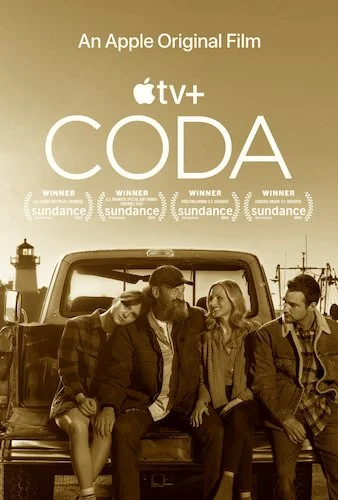CODA
Written by Andreas Babiolakis
This review is a part of the Best Picture Project: a review of every single Academy Award winner for the Best Picture category. CODA is the ninety forth Best Picture winner at the 2021 Academy Awards.
It only makes sense that the Academy Awards played it safe after months of controversial decisions surrounding its ceremony, ranging from categories being axed from the live event to adding a whopping three hosts after not having a single host for years. Nonetheless, CODA is a crowd pleaser that may place the awards back in at least some good books, but I also think the film’s win speaks about so much more of this recent history than just the ceremony alone. If anything, CODA has had a bit of an uphill battle, outside of being a wide favourite of audiences. Despite being one of the most popular independent films of the year, it didn’t make a dent at the Independent Spirit Awards (which is usually a good indicator of what will do well during the awards season). Troy Kotsur didn’t win the Golden Globe, even though he quickly would become the Best Supporting Actor favourite afterwards. Outside of some glimpses of hope, including the SAG and PGA wins, CODA didn’t seem to have a chance. And yet here we are. The warmth of this blue collared, highly representational film has made a big enough splash that it overthrew the highly-nominated behemoths of The Power of the Dog, Belfast, and Dune (amongst others). CODA had very few nominations, but it didn’t matter.
Sian Heder has gotten comfortable with her second feature film as a director: a better version of La Famille Bélier. The film really clicked with audiences because of its loving representation of deaf families. CODA – which stands for “child of deaf adults” – stars Emilia Jones as a high school student that is chasing her dreams of being a singer. The rest of her family is deaf; her mother resents her aspiring to be musical when it’s something that doesn’t benefit or consider her family; her father and brother are hard working fishermen that are being toyed around with. With these ideas alone, CODA not only relates with entire communities that cinema has ignored or trivialized for decades, but with many other viewers as well; teens that feel like the right decision is wrong in the eyes of others; hard working class families that have had a lot of challenges in general (and especially during the pandemic, although CODA doesn’t take place during it, its time of release is still cathartic), and parents that wish to remain connected with their children and not lose them in any way.
CODA is a crowd pleaser: something that many people are happy to champion during challenging times.
CODA is a layered tale when it comes to who it connects with, but it still is told extremely simply, and not necessarily in the best way. I feel like the surrender to plot conveniences and tropes really gets in the way of much of the story and it’s capabilities, thus rendering what could have been a more magical experience into a more conventional slice of familiarity. This stymies the film enough that I love parts of it (the strong acting across the board, the tenderness, the balance between comedy and drama) but still feel content having experienced the film once. It stands out, sure, but not nearly as much as it could have. Still, it stood out enough at this particular time to win over many viewers and Academy members. It’s not a masterpiece, but it felt necessary to champion and love now. Besides, of the Best Picture nominees, CODA is easily the warmest film, and I think that counted for something in 2022.
Andreas Babiolakis has a Masters degree in Film and Photography Preservation and Collections Management from X University (formerly known as Ryerson), as well as a Bachelors degree in Cinema Studies from York University. His favourite times of year are the Criterion Collection flash sales and the annual Toronto International Film Festival.






